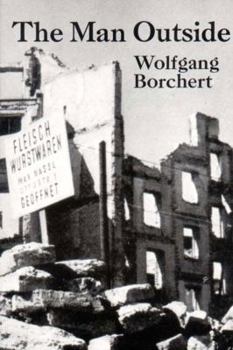The Man Outside: Play & Stories
Select Format
Select Condition 
Book Overview
Wolfgang Borchert died in 1947--the twenty-six-year-old victim of a malaria-like fever contracted during World War II. This was just one day after the premier of his play, The Man Outside, which caused an immediate furor throughout his native Germany with its youthful, indeed revolutionary, vision against war and the dehumanizing effects of the police state. In a very real sense, Borchert was both the moral and physical victim of the Third Reich and the Nazi war machine. As a Wehrmacht conscript, he twice served on the Russian front, where he was wounded, and twice was imprisoned for his outspokenness. His voice speaks plainly and powerfully from out of the war's carnage all the more poignantly for its being cut short at so young an age.
Format:Paperback
Language:English
ISBN:0811200116
ISBN13:9780811200110
Release Date:January 1971
Publisher:New Directions Publishing Corporation
Length:288 Pages
Weight:0.70 lbs.
Dimensions:0.8" x 5.3" x 8.0"
Customer Reviews
3 ratings
The Voice of the Victims of Germany after WWII
Published by Thriftbooks.com User , 16 years ago
Not everyone supported the Nazi regime. Borchert was one of them. From an early age he wanted to write plays and stories. While serving in the army, he was constantly getting into trouble with his anti-war, anti-Nazi sentiments. He tried to wound himself to get out of the Wehrmacht. This didn't work. He returned home after the war to die two years later. The Man Outside, the title play was his most famous work and the most haunting. Becker, like Bochert, is a man coming home to Germany. He attempts suicide at the beginning of the play by throwing himself into the River Elbe. The Elbe rejects him. He must live and experience life. Becker is wounded in spirit, he goes from scene to scene in search of himself, his homeland. The piece is reminiscent of the Stations of the Cross plays of the Medieval era. The world he finds is trying to move on without emotionally coming to grips with the devestation of the Nazi regime. The remaining stories are brilliant vignettes of army life and post-army life. The men, women and children who dwell in these stories are the Germans trying to rebuild their lives, leaving the dead behind, finding enough to eat, surviving in the wasteland left to them by Hitler and the Allied Bombings that devastated the majority of German cities. Most of us have some idea of pre-WWII Germany, photographic images of rallies and army marches. Bochert's world is the dark awakening from the Aryan Nightmare. Like Boll, Bochert despised the Nazi world. If you read Boll, pick up The Man Outside.
Extraordinary
Published by Thriftbooks.com User , 17 years ago
This play by Wolfgang Borchert is simply extraordinary. It is about those who returned from the war and found their country, and lives destroyed, and themselves haunted by their terrible experiences. This short play should be a must read for everybody.
It was like that.
Published by Thriftbooks.com User , 27 years ago
Borchert did not write for us. He spoke for the dead, the victims of a war they did not begin and neither wanted to win nor lose but to simply stop immediately. His love was for the victims, his hatred for those who lived on as if nothing ever happened. His work is the cry of a devastated generation returning to devastated cities inhabited by devastated people. After the war Borchert had only two years before he died and those he spent every minute writing, knowing that the end was near. Some of his earlier poems show clearly how much he loved and valued life. Everything he ever wanted was to live in peace. Even after he everything but physically lost his life in World War II he somehow found the strength to carry on, to fight against his fate. "Whatever comes tomorrow, and be it sorrow: I say YES." Not only Borchert finally lost. He wrote the legacy of his generation. It is up to us if their death will be remembered. Ignoring their cry will ensure that new generations will share their fate. In my opinion everything Borchert wrote boils down to: Never forget what it did to us and never ever let it happen again. Do I like Borchert's style? Do I adore his poems? Do I admire his technique? Rest assured: with Borchert it doesn't matter.






